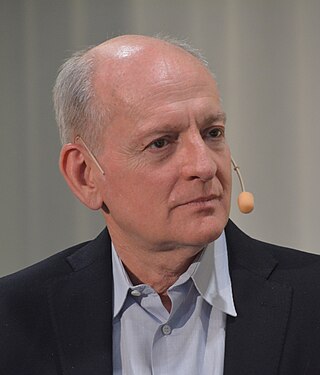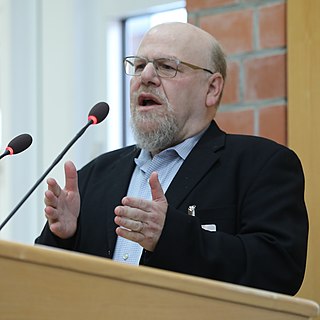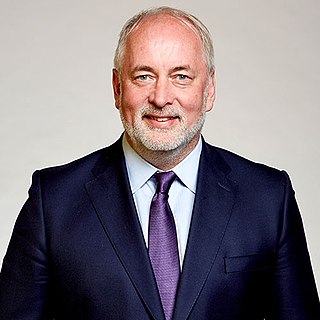
Stuart Jonathan Russell is a British computer scientist known for his contributions to artificial intelligence (AI). He is a professor of computer science at the University of California, Berkeley and was from 2008 to 2011 an adjunct professor of neurological surgery at the University of California, San Francisco. He holds the Smith-Zadeh Chair in Engineering at University of California, Berkeley. He founded and leads the Center for Human-Compatible Artificial Intelligence (CHAI) at UC Berkeley. Russell is the co-author with Peter Norvig of the authoritative textbook of the field of AI: Artificial Intelligence: A Modern Approach used in more than 1,500 universities in 135 countries.

James Alexander Hendler is an artificial intelligence researcher at Rensselaer Polytechnic Institute, United States, and one of the originators of the Semantic Web. He is a Fellow of the National Academy of Public Administration.
Saul Amarel was a professor of computer science at Rutgers University, and best known for his pioneering work in artificial intelligence (AI). He also had a career as a scientist, engineer, and teacher. He was a contributor to advanced computing and AI methodologies, both applied to scientific inquiry as well as engineering practice.

Richard S. Sutton is a Canadian computer scientist. He is a professor of computing science at the University of Alberta and a research scientist at Keen Technologies. Sutton is considered one of the founders of modern computational reinforcement learning, having several significant contributions to the field, including temporal difference learning and policy gradient methods.

Manuela Maria Veloso is the Head of J.P. Morgan AI Research & Herbert A. Simon University Professor Emeritus in the School of Computer Science at Carnegie Mellon University, where she was previously Head of the Machine Learning Department. She served as president of Association for the Advancement of Artificial Intelligence (AAAI) until 2014, and the co-founder and a Past President of the RoboCup Federation. She is a fellow of AAAI, Institute of Electrical and Electronics Engineers (IEEE), American Association for the Advancement of Science (AAAS), and Association for Computing Machinery (ACM). She is an international expert in artificial intelligence and robotics.
Leslie Pack Kaelbling is an American roboticist and the Panasonic Professor of Computer Science and Engineering at the Massachusetts Institute of Technology. She is widely recognized for adapting partially observable Markov decision processes from operations research for application in artificial intelligence and robotics. Kaelbling received the IJCAI Computers and Thought Award in 1997 for applying reinforcement learning to embedded control systems and developing programming tools for robot navigation. In 2000, she was elected as a Fellow of the Association for the Advancement of Artificial Intelligence.

Eric Joel Horvitz is an American computer scientist, and Technical Fellow at Microsoft, where he serves as the company's first Chief Scientific Officer. He was previously the director of Microsoft Research Labs, including research centers in Redmond, WA, Cambridge, MA, New York, NY, Montreal, Canada, Cambridge, UK, and Bangalore, India.
David Leigh Waltz was a computer scientist who made significant contributions in several areas of artificial intelligence, including constraint satisfaction, case-based reasoning and the application of massively parallel computation to AI problems. He held positions in academia and industry and at the time of his death, was a professor of Computer Science at Columbia University where he directed the Center for Computational Learning Systems.

Nicholas Robert Jennings is a British computer scientist and the current Vice-Chancellor and President of Loughborough University. He was previously the Vice-Provost for Research and Enterprise at Imperial College London, the UK's first Regius Professor of Computer Science, and the inaugural Chief Scientific Adviser to the UK Government on National Security. His research covers the areas of AI, autonomous systems, agent-based computing and cybersecurity.

Eric Poe Xing is an American computer scientist whose research spans machine learning, computational biology, and statistical methodology. Xing is founding President of the world’s first artificial intelligence university, Mohamed bin Zayed University of Artificial Intelligence (MBZUAI).
Michael Justin Kearns is an American computer scientist, professor and National Center Chair at the University of Pennsylvania, the founding director of Penn's Singh Program in Networked & Social Systems Engineering (NETS), the founding director of Warren Center for Network and Data Sciences, and also holds secondary appointments in Penn's Wharton School and department of Economics. He is a leading researcher in computational learning theory and algorithmic game theory, and interested in machine learning, artificial intelligence, computational finance, algorithmic trading, computational social science and social networks. He previously led the Advisory and Research function in Morgan Stanley's Artificial Intelligence Center of Excellence team, and is currently an Amazon Scholar within Amazon Web Services.

Francesca Rossi is an Italian computer scientist, currently working at the IBM Thomas J. Watson Research Center as an IBM Fellow and the IBM AI Ethics Global Leader.

Shlomo Zilberstein is an Israeli-American computer scientist. He is a Professor of Computer Science and Associate Dean for Research and Engagement in the College of Information and Computer Sciences at the University of Massachusetts, Amherst. He graduated with a B.A. in Computer Science summa cum laude from Technion – Israel Institute of Technology in 1982, and received a Ph.D. in Computer Science from University of California at Berkeley in 1993, advised by Stuart J. Russell. He is known for his contributions to artificial intelligence, anytime algorithms, multi-agent systems, and automated planning and scheduling algorithms, notably within the context of Markov decision processes (MDPs), Partially Observable MDPs (POMDPs), and Decentralized POMDPs (Dec-POMDPs).

Pedro Domingos is a Professor Emeritus of computer science and engineering at the University of Washington. He is a researcher in machine learning known for Markov logic network enabling uncertain inference.
David Silver is a principal research scientist at Google DeepMind and a professor at University College London. He has led research on reinforcement learning with AlphaGo, AlphaZero and co-lead on AlphaStar.

Thomas G. Dietterich is emeritus professor of computer science at Oregon State University. He is one of the pioneers of the field of machine learning. He served as executive editor of Machine Learning (journal) (1992–98) and helped co-found the Journal of Machine Learning Research. In response to the media's attention on the dangers of artificial intelligence, Dietterich has been quoted for an academic perspective to a broad range of media outlets including National Public Radio, Business Insider, Microsoft Research, CNET, and The Wall Street Journal.

Marie desJardins is an American computer scientist, known for her research on artificial intelligence and computer science education. She is also active in broadening participation in computing.

Charles Lee Isbell Jr. is an American computationalist, researcher, and educator. He is Provost and Vice Chancellor for Academic Affairs at the University of Wisconsin–Madison. Before joining the faculty there, he was a professor at the Georgia Institute of Technology College of Computing starting in 2002, and served as John P. Imlay, Jr. Dean of the College from July 2019 to July 2023. His research interests focus on machine learning and artificial intelligence, particularly interactive and human-centered AI. He has published over 100 scientific papers. In addition to his research work, Isbell has been an advocate for increasing access to and diversity in higher education.
Sheila McIlraith is a Canadian computer scientist specializing in Artificial Intelligence (AI). She is a Professor in the Department of Computer Science, University of Toronto. She is a Canada CIFAR AI Chair, a faculty member of the Vector Institute, and Associate Director and Research Lead of the Schwartz Reisman Institute for Technology and Society.

Thomas L. Dean is an American computer scientist known for his work in robot planning, probabilistic graphical models, and computational neuroscience. He was one of the first to introduce ideas from operations research and control theory to artificial intelligence. In particular, he introduced the idea of the anytime algorithm and was the first to apply the factored Markov decision process to robotics. He has authored several influential textbooks on artificial intelligence.














